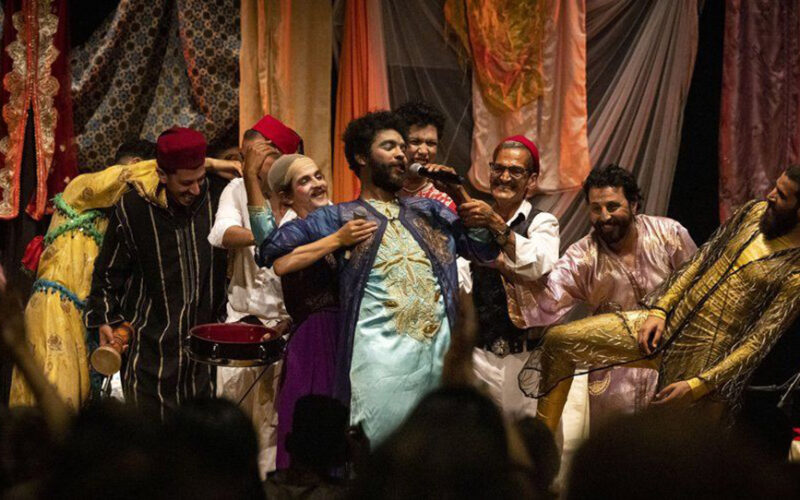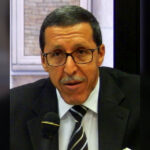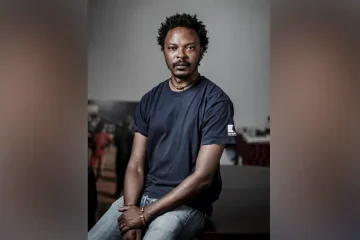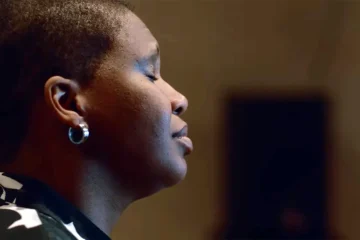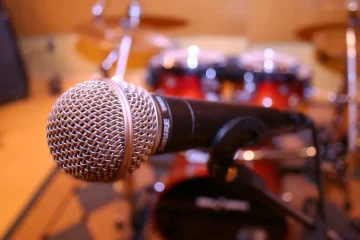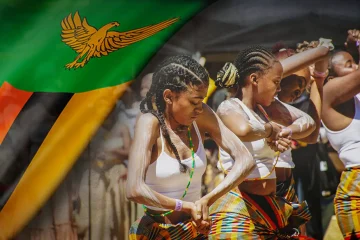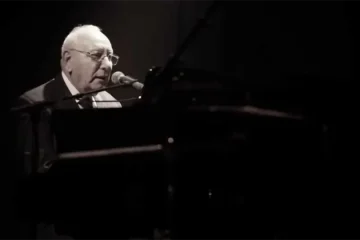IMAD SAOUDI FOR BIRD STORY AGENCY
DRESSED in colourful caftans and sporting wigs, bold make-up and glittering jewellery, the Kabareh Cheikhats troup is singing and swaying their hips, exploring issues of femininity in ways that might seem surprising in a conservatively patriarchal society.
The all-male band is paying homage to the Cheikhats, Morocco’s most famous historical female traditional folk singers, once renowned in the region and responsible for chants, called Aitas, that remain extremely popular.
Sometimes compared to Geishas, Cheikhats have been intriguing and controversial figures throughout Moroccan history.
They were singers, dancers, poets, and preservers of esoteric musical lore. Their independence from the codes and rules dominating a woman’s life in traditional society made them loved and hated in equal measure.
Today, the Kabareh Cheikhats cover Cheikhat songs and emulate their work and life through performances in drag. They also explore societal and cultural issues – but the most obvious thing about their performances is the blurring of gender lines.
The Kabareh Cheikhats say they want to liberate the man’s body from the age-old clichés of masculinity. It’s a bold and subversive act.
“Gender roles are never set in stone and are always subject to changes throughout history,” explained the group’s lead singer, Ghassan El Hakim.
Beyond the politics of their act, however, the group is incredibly entertaining, and their electrifying performances have mesmerised even their biggest critics.
“Women bear history. They transmit knowledge, values and sometimes even religion…. A Cheikhat must know a multitude of Aitas and songs that she, in turn, transmits to others. She is a source of social history and oral tradition,” said Amine Nawny, a member of the Kabareh Cheikhats.
The troupe also explores local history, reminding audiences that their unapologetic act is not a new phenomenon in the kingdom. It is not imported, nor does it clash with local artistic expression. It is a musical tradition that is very much rooted in Moroccan history.
Nor is the practice of men impersonating women novel in the country.
Bouchaib El Bidaoui, an icon of Moroccan theatre, has played women’s roles and danced to the frantic rhythms of Cheikhat on multiple occasions. Moreover, one can easily find men dressed as Cheikhats in Marrakech’s legendary market square, Jemaa El Fnaa.
Nawny said that the hours and hours he has spent in a Cheikhat’s shoes have made him more sensitive to women’s causes and he is keen to do them justice on stage.
“It is first and foremost my experiences of the woman’s world, within the family, and within society as a whole, that made me feel closer to the feminine and feminist cause. These stories and experiences have also saved me from thinking that dressing up as a woman is a social shame,” he said.
As for El Hakim, he says they grew even more cognizant of the female condition in a male-dominated society after being subjected to the male gaze on stage.
“The looks we receive are obviously different when we wear caftans and have make-up on. It makes us even more conscious of the fact that women go through this daily,” he said.
The female audience of Kabareh Cheikhats is also appreciative of the homage.
A concertgoer found the performance “very daring considering the society we live in and some of the regressive cultural values we have to live by.”
She added that she was mostly worried about the reaction of a male friend, “quite the patriarchal type,” who ended up “compelled by the music and the show before having derogatory comments towards the performers after the event”
The Casablanca-based theatre troupe might be divisive, but it has the merit of starting a dialogue.
“When we see a negative comment on social media, it’s a good sign for us. It means we have triggered a thinking process and discussions regarding the Cheikhat and Aita, different gender expressions, and gender roles,” said El Hakim.
The Kabareh Cheikhats has been called a breath of fresh air on the Moroccan music scene, which is dominated by rap and pop acts.
Their reappropriating of Aita traditional music genre has also come at a time when it has been deemed “uncool” by younger Moroccan generations.
According to El Hakim, watching some perplexed looks at the beginning of a performance turn into genuine fun, laughter, and even dancing, has been particularly rewarding for the band.

